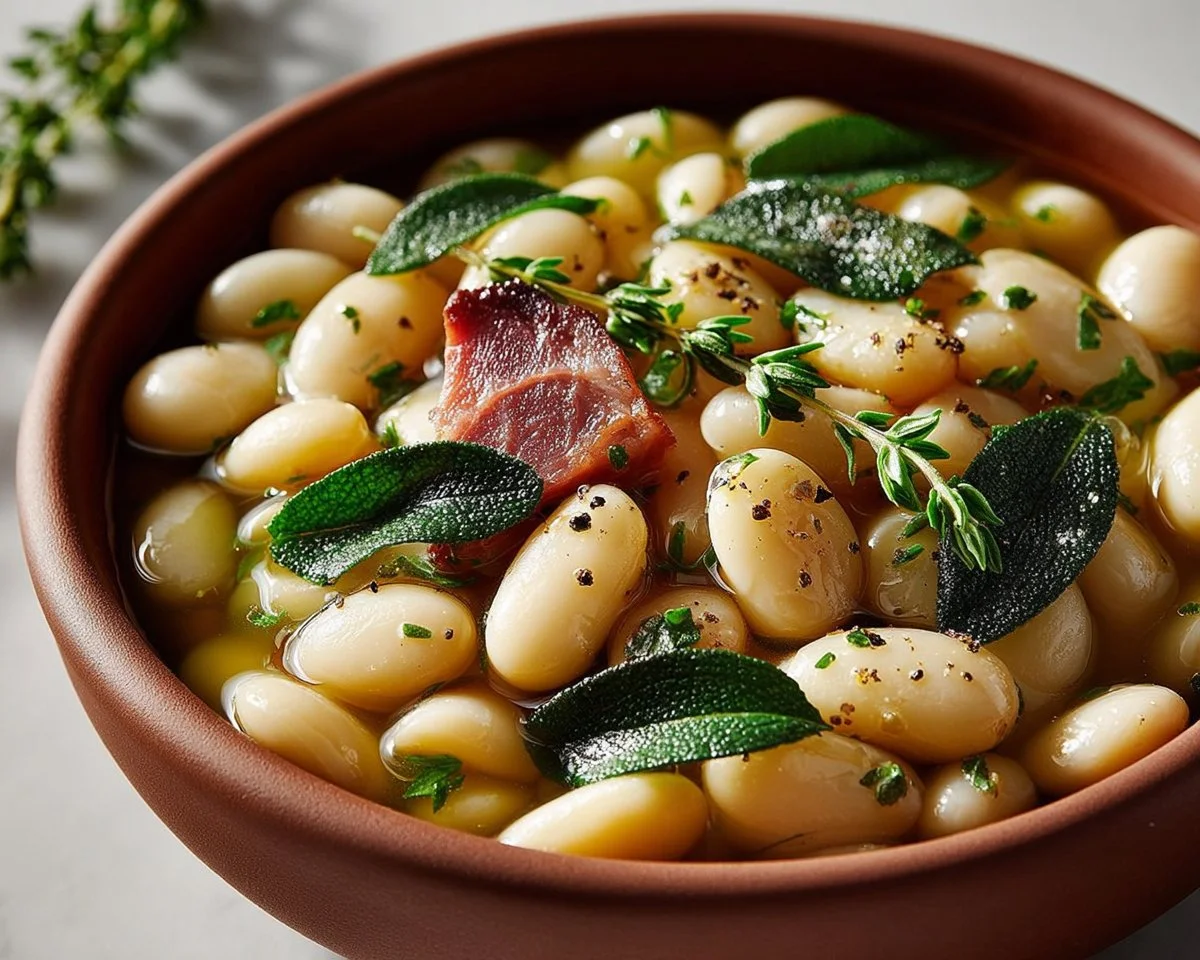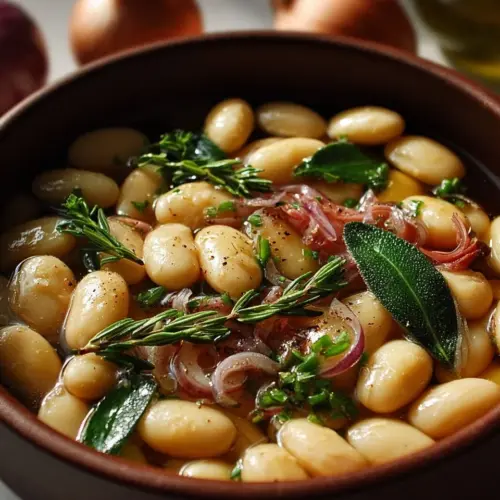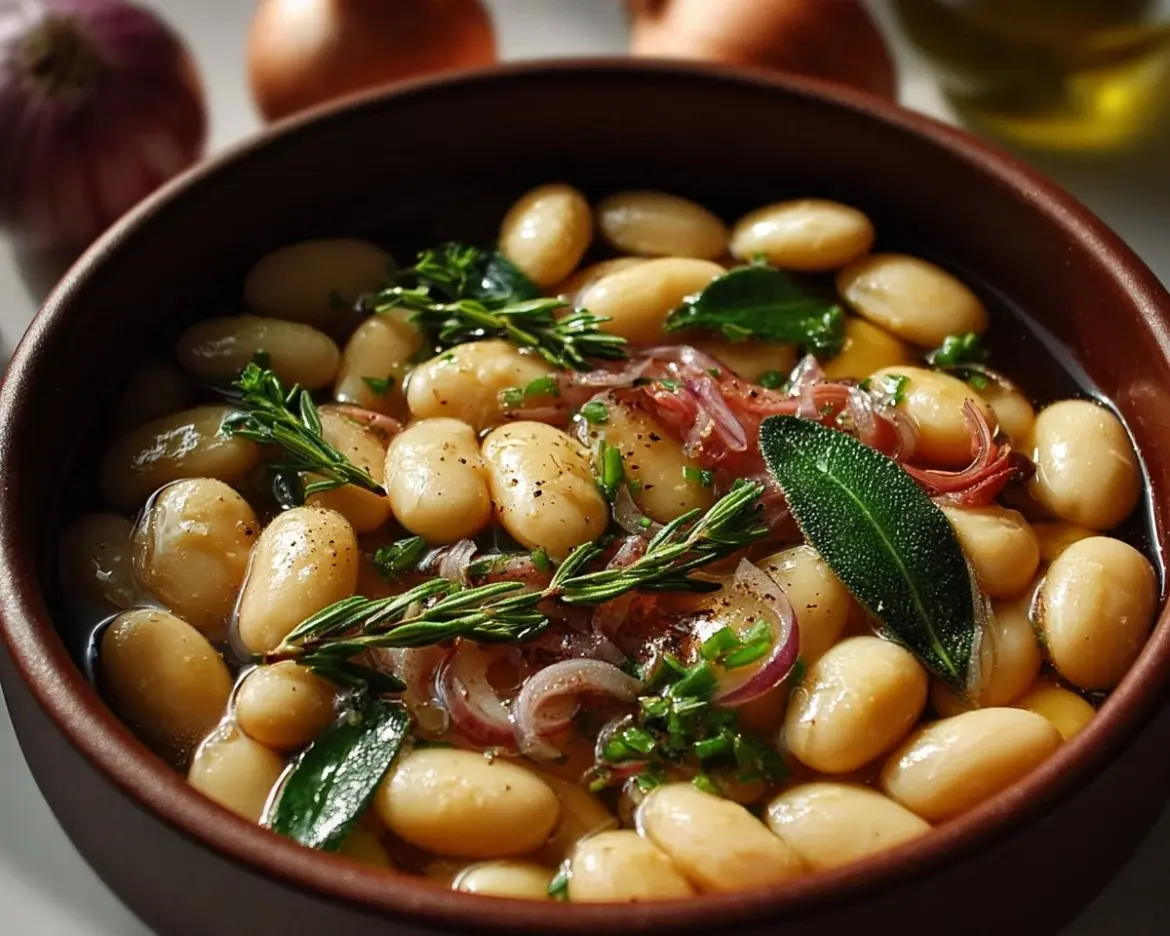Creamy, comforting, and full of smoky flavor, Southern Butter Beans are the kind of dish that hugs your insides and brings everyone around the table. This simple pot of tender beans simmered with a ham hock yields a rich, soulful side (or main) that takes very little hands-on time but delivers big on taste. Fun fact: butter beans are just big lima beans, and they get extra silky when cooked slowly with a bit of pork for depth — Southern kitchens have been doing this for generations. If you love easy, homey recipes, you’ll appreciate how this one comes together quickly and feeds a crowd. For another take on classic beans, see my notes on butter beans for more inspiration. Grab a pot, and let’s make something truly comforting.
What is Southern Butter Beans Recipe?
What’s in a name? Southern Butter Beans are basically large lima beans cooked until luxuriously tender, often flavored with smoked pork and simple aromatics. Why “butter”? Because the texture becomes buttery-smooth and the beans practically melt on your fork. Curious where the recipe came from — a granny’s kitchen, a church potluck, or a neighbor’s back porch? Probably all of the above. Some say it proves that “the way to a man’s heart is through his stomach.” Who can argue after a bowl of these? Try it and decide for yourself — your guests might just insist on seconds.
Why You’ll Love This
- Comforting creaminess: The beans cook down to a silky, rich texture that feels indulgent without being heavy.
- Economical and filling: Dried beans or fresh butter beans are budget-friendly and stretch a meal — perfect for feeding a family.
- Smoky, savory depth: A smoked ham hock adds savory complexity so you need only a few pantry staples to make a memorable dish.
If you enjoyed our buttery bean base, you might also like pairing it with a savory spread from the blog, such as a savory cowboy butter recipe to brighten slices of warm cornbread. Make a pot and see how quickly it becomes a weeknight favorite.
How to Make
Quick Overview
This Southern Butter Beans recipe is straightforward: simmer a smoked ham hock to make a flavorful broth, add beans and aromatics, then cook until meltingly tender. The texture is creamy and comforting, with a rich, slightly smoky broth. Expect about 15 minutes active prep and 1 to 1 1/2 hours total cooking time depending on bean age and whether you use dried or fresh beans.
Prep and Cook Time
- Active prep: 10–15 minutes
- Simmering/cooking: 1 to 1 1/2 hours (less for fresh beans)
Ingredients
- 2 cups Butter beans (Dried or fresh) — if dried, soak overnight or quick-soak before cooking
- 1 piece Smoked ham hock (For flavoring) — whole piece
- 1 medium Onion (Chopped) — roughly chopped
- 2 cloves Garlic (Minced) — finely minced
- 1 teaspoon Salt (To taste) — add gradually and adjust at the end
- 1 teaspoon Pepper (To taste) — freshly ground preferred
- Water — enough to cover beans and ham hock by about 1 to 2 inches (approximately 6–8 cups)
Directions
- If using dried butter beans and you soaked them overnight, drain and rinse. For a quick-soak: cover with water, bring to a boil 2 minutes, remove from heat and soak 1 hour, then drain and rinse. If using fresh beans, rinse and sort.
- Place the smoked ham hock in a large heavy-bottom pot and cover with about 6 cups of cold water. Bring to a simmer over medium heat.
- Reduce heat to low and simmer the ham hock for 30–40 minutes to extract flavor. Skim any foam that rises to the surface.
- Add the prepared butter beans, chopped onion, and minced garlic to the pot. Stir gently to combine.
- Bring the pot back to a gentle simmer, then reduce heat to low, cover partially, and cook for 45–60 minutes if dried (30–40 minutes for fresh) until beans are fork-tender. Stir occasionally and add more water if needed to keep beans covered.
- Remove the ham hock and shred the meat from the bone with forks; return the meat to the pot for extra flavor (or discard bone and cartilage).
- Season with salt and pepper to taste. If the broth is too thin, cook uncovered for the last 10–15 minutes to reduce and thicken slightly. For a silkier texture, mash a few beans against the side of the pot and stir.
- Serve hot as a side or main with warm cornbread, steamed rice, or a crisp green salad.

What to Serve With
- Classic pairing: warm cornbread or homemade biscuits soak up the savory broth perfectly.
- Rice: white rice or brown rice turns the beans into a hearty main dish.
- Greens: Southern collard greens or sautéed kale offer a bright, slightly bitter contrast.
- Pickles or slaw: a tangy coleslaw or pickled onions cut through the richness.
- Drinks: sweet iced tea, a crisp lager, or a sparkling lemonade balance the smoky flavors.
Top Tips for Perfecting
- Soak dried beans: soaking reduces cooking time and helps ensure even tenderness.
- Ham hock alternatives: smoked turkey leg or a few strips of bacon work if you don’t have a ham hock.
- Salt late: add most salt toward the end of cooking to avoid toughening the beans.
- Texture control: mash a few beans for a naturally creamy sauce without adding dairy.
- Patience matters: older dried beans take longer; cook low and slow for the best texture.
- Avoid over-stirring: stir gently to prevent beans from breaking apart too much.
Storing and Reheating Tips
- Refrigeration: Cool completely, transfer to an airtight container, and refrigerate for up to 4 days.
- Freezing: Portion into freezer-safe containers and freeze for up to 3 months. Thaw overnight in the fridge before reheating.
- Reheating: Reheat gently on the stove over low heat, adding a splash of water or broth if the mixture has thickened. Microwave in covered containers, stirring halfway through to heat evenly.
- Tip: Flavors often improve after a day, so leftovers can taste even better.
FAQs
Can I make this recipe without soaking the dried beans?
Yes, you can cook unsoaked dried beans, but they will take significantly longer — often 1 1/2 to 2 hours — and may cook less evenly. Soaking speeds the process and improves texture.
Can I use canned butter beans instead of dried?
Absolutely. Use drained canned beans and add them later in cooking to warm through for 10–15 minutes. Canned beans reduce total cook time and still deliver great flavor.
Is a ham hock necessary for flavor?
No, but it lends that classic smoky depth. Smoked turkey leg, bacon, or a ham bone can be used as substitutes with delicious results.
How can I make the broth thicker and creamier?
Mash a small portion of the beans in the pot or cook uncovered for the last 10–15 minutes to reduce liquid. A splash of cream or a pat of butter can enrich it further if you like.
Can this be made vegetarian?
Yes. Omit the ham hock and use vegetable broth plus a teaspoon of smoked paprika or liquid smoke to mimic the smoky flavor.
Conclusion
Southern Butter Beans are a timeless, budget-friendly recipe that brings big flavor with minimal fuss. It’s an easy, family-friendly dish that rewards patience and pairs beautifully with cornbread, rice, or greens. If you want another trusted version to compare techniques or flavorings, check out this classic take on Southern Butter Beans – The Daring Gourmet for inspiration and variations. Give this simple, soulful recipe a try — serve it to friends, and watch how quickly it becomes a go-to comfort food.

Southern Butter Beans
Equipment
- Large Heavy-Bottom Pot
- Mixing Bowl
Ingredients
Ingredients
- 2 cups Butter beans (Dried or fresh) If dried, soak overnight or quick-soak before cooking.
- 1 piece Smoked ham hock For flavoring.
- 1 medium Onion Chopped.
- 2 cloves Garlic Minced.
- 1 teaspoon Salt To taste.
- 1 teaspoon Pepper To taste, freshly ground preferred.
- 6 cups Water Enough to cover beans and ham hock by about 1 to 2 inches.
Instructions
- If using dried butter beans and you soaked them overnight, drain and rinse. For a quick-soak: cover with water, bring to a boil 2 minutes, remove from heat and soak 1 hour, then drain and rinse. If using fresh beans, rinse and sort.
- Place the smoked ham hock in a large heavy-bottom pot and cover with about 6 cups of cold water. Bring to a simmer over medium heat.
- Reduce heat to low and simmer the ham hock for 30–40 minutes to extract flavor. Skim any foam that rises to the surface.
- Add the prepared butter beans, chopped onion, and minced garlic to the pot. Stir gently to combine.
- Bring the pot back to a gentle simmer, then reduce heat to low, cover partially, and cook for 45–60 minutes if dried (30–40 minutes for fresh) until beans are fork-tender. Stir occasionally and add more water if needed to keep beans covered.
- Remove the ham hock and shred the meat from the bone with forks; return the meat to the pot for extra flavor (or discard bone and cartilage).
- Season with salt and pepper to taste. If the broth is too thin, cook uncovered for the last 10–15 minutes to reduce and thicken slightly. For a silkier texture, mash a few beans against the side of the pot and stir.
- Serve hot as a side or main with warm cornbread, steamed rice, or a crisp green salad.

